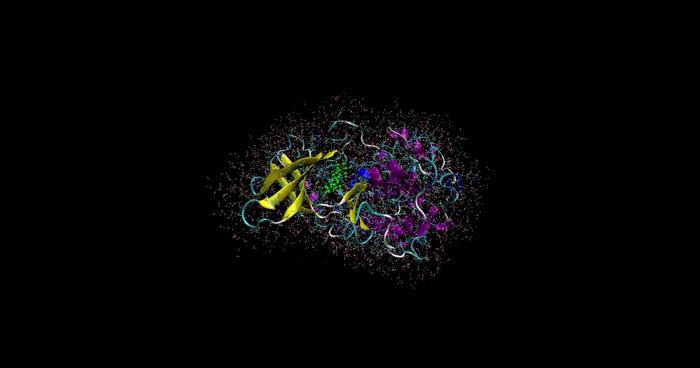Led by University of Melbourne theoretician and HPC expert Associate Professor Giuseppe Barca, a research team has achieved the first quantum simulation of biological systems at a scale necessary to accurately model drug performance.

Credit: Associate Professor Giuseppe Barca
Led by University of Melbourne theoretician and HPC expert Associate Professor Giuseppe Barca, a research team has achieved the first quantum simulation of biological systems at a scale necessary to accurately model drug performance.
Utilising the unprecedented “exascale” power of the Frontier supercomputer at the Oak Ridge Leadership Computing Facility in Tennessee, US, the team has developed groundbreaking software capable of accurately predicting the chemical reactions and physical properties of molecular systems comprising up to hundreds of thousands of atoms – delivering highly precise predictions of molecular behaviour and setting a new benchmark in computational chemistry.
The project brought together expertise in chemistry, drug discovery, quantum mechanics, and supercomputing, with the Oak Ridge National Laboratory, leading semiconductor company AMD and deep-tech startup QDX collaborating on the project.
The result of more than four years of record-breaking research, this advancement allows for the study of biomolecular-scale systems with quantum-level accuracy for the first time ever. This cutting-edge simulation capability enables the observation and understanding of these systems in unprecedented detail, which is crucial for improving the evaluation of traditional drugs and designing new therapeutics that interact more effectively with target biological systems.
“This breakthrough enables us to simulate drug behaviour with an accuracy that rivals physical experiments. We can now observe not just the movement of a drug but also its quantum mechanical properties, such as bond breaking and formation, over time in a biological system. This is vital for assessing drug viability and designing new treatments,” Associate Professor Barca said.
Today, over 80 per cent of disease-causing proteins cannot be treated with existing drugs, and only two per cent work with known drugs. This shows how limited current methods are. Advanced quantum mechanics and HPC broadens the computational toolset for drug discovery, providing unprecedented levels of speed and accuracy at biologically-relevant scale. Importantly, they also provide insights and capabilities previously not possible with traditional computational chemistry to unlock new ways of modulating targets of therapeutic interest and expand the number of disease targets for which effective therapies are available.
The simulations compute a drug molecule’s affinity for a specific target, such as a genetically mutated protein causing disease. Algorithms then calculate the drug’s effectiveness by evaluating the strength of the bond between the drug and the target, demonstrating drug potency. To test a drug effectively through quantum simulation, the biological model system must integrate thousands of atoms.
“This is exactly why we built Frontier, to tackle larger, more complex problems facing society,” said Dmytro Bykov, a computational chemist at Oak Ridge National Laboratory. “By breaking the exascale barrier, these simulations push our computing capabilities into a brand new world of possibilities with unprecedented levels of sophistication and radically faster times to solution — and this is just the beginning of the exascale era.”
Dr Jakub Kurzak, principal member of technical staff at AMD and representative for AMD at Oak Ridge National Laboratory, said: “We are thrilled to see AMD high performance computing technologies enable breakthrough exascale science in medical research and deliver the computing performance to accurately model the highly complex physics of molecular systems for drug discovery.”
Loong Wang, Co-Founder and CEO of QDX, said: “At QDX, we are incredibly excited to transform groundbreaking scientific advancements into a powerful, user-friendly platform that accelerates and enhances drug discovery, opening doors to innovative treatments. Our advanced quantum simulations have set a new benchmark for accuracy at a biologically-relevant scales. We hope that this technology will enable new drugs to be developed faster and cheaper, and for diseases that have — so far — been too difficult to treat.”
Associate Professor Barca, based in the Faculty of Engineering and Information Technology’s School of Computing and Information Systems, was nominated by The Australian as one of Australia’s Top 250 Researchers in 2024.
In 2023, he co-founded the company QDX, which is already using high-performance quantum simulations to accelerate new therapeutics design. QDX has secured commercial deals with pharmaceutical companies and tech start-ups in Australia, Singapore and the US.
“Thanks to new computing and software capabilities that enable accurate modelling at the quantum mechanical level, we can achieve predictive accuracy close to experimental results. These calculations were completely unfeasible just a few years ago,” Associate Professor Barca said.



